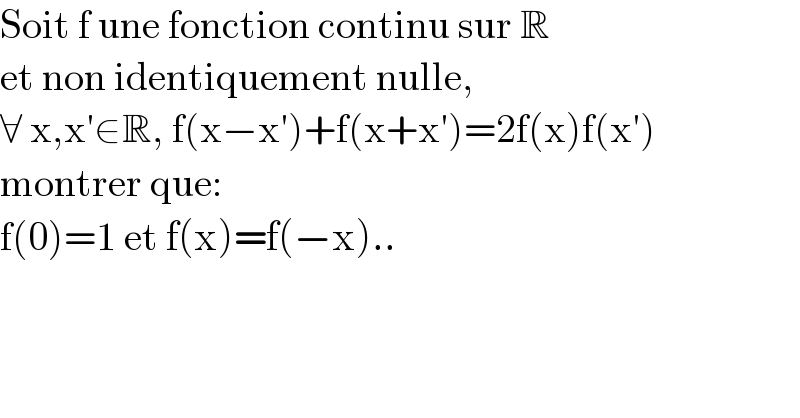
Question Number 148483 by puissant last updated on 28/Jul/21

$$\mathrm{Soit}\:\mathrm{f}\:\mathrm{une}\:\mathrm{fonction}\:\mathrm{continu}\:\mathrm{sur}\:\mathbb{R} \\ $$$$\mathrm{et}\:\mathrm{non}\:\mathrm{identiquement}\:\mathrm{nulle}, \\ $$$$\forall\:\mathrm{x},\mathrm{x}'\in\mathbb{R},\:\mathrm{f}\left(\mathrm{x}−\mathrm{x}'\right)+\mathrm{f}\left(\mathrm{x}+\mathrm{x}'\right)=\mathrm{2f}\left(\mathrm{x}\right)\mathrm{f}\left(\mathrm{x}'\right) \\ $$$$\mathrm{montrer}\:\mathrm{que}: \\ $$$$\mathrm{f}\left(\mathrm{0}\right)=\mathrm{1}\:\mathrm{et}\:\mathrm{f}\left(\mathrm{x}\right)=\mathrm{f}\left(−\mathrm{x}\right).. \\ $$
Answered by Olaf_Thorendsen last updated on 28/Jul/21
![∀ x,x′ ∈R, f(x−x′)+f(x+x′) = 2f(x)f(x′) • En particulier pour x = x′ = 0 : f(0−0)+f(0+0) = 2f(0)f(0) 2f(0) = 2f(0)f(0) f(0)[f(0)−1] = 0 Et donc f(0) = 0 ou f(0) = 1 (1) • ∀ x∈R et pour x′ = 0 : f(x−0)+f(x+0) = 2f(x)f(0) 2f(x) = 2f(x)f(0) (2) Si, d′apres (1), f(0) = 0 alors (2) : alors ∀ x∈R, f(x) = 0 Mais ca n′est pas possible car on cherche des fonctions f non indentiquement nulles. Et donc, forcement, f(0) = 1. ∀ x,x′ ∈R, f(x−x′)+f(x+x′) = 2f(x)f(x′) • ∀ x′∈R et pour x = 0 : f(0−x′)+f(0+x′) = 2f(0)f(x′) f(−x′)+f(x′) = 2×1×f(x′) f(−x′) = f(x′). On a bien ∀x∈R, f(−x) = f(x) Les fonctions solutions du probleme sont donc des fonctions paires qui prennent la valeur 1 en 0.](Q148490.png)
$$\forall\:{x},{x}'\:\in\mathbb{R},\:{f}\left({x}−{x}'\right)+{f}\left({x}+{x}'\right)\:=\:\mathrm{2}{f}\left({x}\right){f}\left({x}'\right) \\ $$$$ \\ $$$$\bullet\:\mathrm{En}\:\mathrm{particulier}\:\mathrm{pour}\:{x}\:=\:{x}'\:=\:\mathrm{0}\:: \\ $$$${f}\left(\mathrm{0}−\mathrm{0}\right)+{f}\left(\mathrm{0}+\mathrm{0}\right)\:=\:\mathrm{2}{f}\left(\mathrm{0}\right){f}\left(\mathrm{0}\right) \\ $$$$\mathrm{2}{f}\left(\mathrm{0}\right)\:=\:\mathrm{2}{f}\left(\mathrm{0}\right){f}\left(\mathrm{0}\right) \\ $$$${f}\left(\mathrm{0}\right)\left[{f}\left(\mathrm{0}\right)−\mathrm{1}\right]\:=\:\mathrm{0} \\ $$$$\mathrm{Et}\:\mathrm{donc}\:{f}\left(\mathrm{0}\right)\:=\:\mathrm{0}\:\mathrm{ou}\:{f}\left(\mathrm{0}\right)\:=\:\mathrm{1}\:\:\left(\mathrm{1}\right) \\ $$$$ \\ $$$$\bullet\:\forall\:{x}\in\mathbb{R}\:\mathrm{et}\:\mathrm{pour}\:{x}'\:=\:\mathrm{0}\:: \\ $$$${f}\left({x}−\mathrm{0}\right)+{f}\left({x}+\mathrm{0}\right)\:=\:\mathrm{2}{f}\left({x}\right){f}\left(\mathrm{0}\right) \\ $$$$\mathrm{2}{f}\left({x}\right)\:=\:\mathrm{2}{f}\left({x}\right){f}\left(\mathrm{0}\right)\:\:\:\:\left(\mathrm{2}\right) \\ $$$$\mathrm{Si},\:\mathrm{d}'\mathrm{apres}\:\left(\mathrm{1}\right),\:{f}\left(\mathrm{0}\right)\:=\:\mathrm{0} \\ $$$$\mathrm{alors}\:\left(\mathrm{2}\right)\::\:\mathrm{alors}\:\forall\:{x}\in\mathbb{R},\:{f}\left({x}\right)\:=\:\mathrm{0} \\ $$$$\mathrm{Mais}\:\mathrm{ca}\:\mathrm{n}'\mathrm{est}\:\mathrm{pas}\:\mathrm{possible}\:\mathrm{car}\:\mathrm{on} \\ $$$$\mathrm{cherche}\:\mathrm{des}\:\mathrm{fonctions}\:{f}\:\mathrm{non} \\ $$$$\mathrm{indentiquement}\:\mathrm{nulles}. \\ $$$$\mathrm{Et}\:\mathrm{donc},\:\mathrm{forcement},\:{f}\left(\mathrm{0}\right)\:=\:\mathrm{1}. \\ $$$$ \\ $$$$\forall\:{x},{x}'\:\in\mathbb{R},\:{f}\left({x}−{x}'\right)+{f}\left({x}+{x}'\right)\:=\:\mathrm{2}{f}\left({x}\right){f}\left({x}'\right) \\ $$$$\bullet\:\forall\:{x}'\in\mathbb{R}\:\mathrm{et}\:\mathrm{pour}\:{x}\:=\:\mathrm{0}\:: \\ $$$${f}\left(\mathrm{0}−{x}'\right)+{f}\left(\mathrm{0}+{x}'\right)\:=\:\mathrm{2}{f}\left(\mathrm{0}\right){f}\left({x}'\right) \\ $$$${f}\left(−{x}'\right)+{f}\left({x}'\right)\:=\:\mathrm{2}×\mathrm{1}×{f}\left({x}'\right) \\ $$$${f}\left(−{x}'\right)\:=\:{f}\left({x}'\right). \\ $$$$\mathrm{On}\:\mathrm{a}\:\mathrm{bien}\:\forall{x}\in\mathbb{R},\:{f}\left(−{x}\right)\:=\:{f}\left({x}\right) \\ $$$$ \\ $$$$\mathrm{Les}\:\mathrm{fonctions}\:\mathrm{solutions}\:\mathrm{du}\:\mathrm{probleme} \\ $$$$\mathrm{sont}\:\mathrm{donc}\:\mathrm{des}\:\mathrm{fonctions}\:\mathrm{paires}\:\mathrm{qui} \\ $$$$\mathrm{prennent}\:\mathrm{la}\:\mathrm{valeur}\:\mathrm{1}\:\mathrm{en}\:\mathrm{0}. \\ $$
Commented by Olaf_Thorendsen last updated on 28/Jul/21
![Remarque : Ce n′est pas demande ici mais en trigo, on se souvient que : cos(a)cos(b) = (1/2)[cos(a−b)+cos(a+b)]. La fonction cosinus, et plus generalement la famille de fonctions x⇝cos(ωx) sont solutions du probleme.](Q148491.png)
$$\mathrm{Remarque}\:: \\ $$$$\mathrm{Ce}\:\mathrm{n}'\mathrm{est}\:\mathrm{pas}\:\mathrm{demande}\:\mathrm{ici}\:\mathrm{mais}\:\mathrm{en}\: \\ $$$$\mathrm{trigo},\:\mathrm{on}\:\mathrm{se}\:\mathrm{souvient}\:\mathrm{que}\:: \\ $$$$\mathrm{cos}\left({a}\right)\mathrm{cos}\left({b}\right)\:=\:\frac{\mathrm{1}}{\mathrm{2}}\left[\mathrm{cos}\left({a}−{b}\right)+\mathrm{cos}\left({a}+{b}\right)\right]. \\ $$$$\mathrm{La}\:\mathrm{fonction}\:\mathrm{cosinus},\:\mathrm{et}\:\mathrm{plus} \\ $$$$\mathrm{generalement}\:\mathrm{la}\:\mathrm{famille}\:\mathrm{de}\:\mathrm{fonctions} \\ $$$${x}\rightsquigarrow\mathrm{cos}\left(\omega{x}\right)\:\mathrm{sont}\:\mathrm{solutions}\:\mathrm{du} \\ $$$$\mathrm{probleme}. \\ $$
